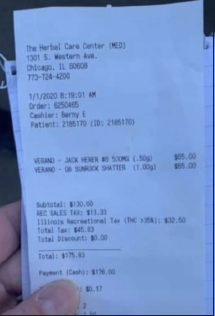Marijuana legally now sold in Illinois

On this receipt, the THC is shown to be taxed by 35% at this shop. Photo courtesy of a shoper at The Herbel Care Center
February 4, 2020
Illinoisans rose from their beds on New Year’s Day to the new and booming industry of legal recreational marijuana. Devotees lined the 20 some dispensaries celebrating in unison as old perspectives were toppled. To smoke marijuana in the minds of Illinois legislators is fine and dandy, made evident by the staggering $10 million grossed by facilities within the first week.
While cannabis Illinois seems to be flourishing, not all are content. As people flooded dispensaries so did the online posts revealing the shocking tax on the hippy-herb. Currently, of the 10 states under legal recreational marijuana legislation, Illinois boasts the second-highest tax burden on retail sales according to a review of state and local regulation.
In Chicago, consumers found themselves paying an upward tax of 41.25% on marijuana products after factoring in the Cook County excise tax. Additionally, the total doesn’t even include the 7% state wholesale tax further up the supply and production chain, which buyers will encounter in the form of higher prices. With so much emphasis on taxation, it begs the question: Where’s all that revenue going?
Put down your tinfoil hats, there isn’t any shady government action going on. In fact, our public officials have been very transparent. Toi Hutchinson, senior adviser to the governor J.B Pritzker in a conference earlier this month worked to quench public inquiries. The senior adviser shared his high hopes for the booming industry and absurd review stating, “The amazing thing about that sales total is that there is a significant portion of these dollars that go directly into a community investment fund so that we can continue to rebuild communities that have been hit by the war on drugs.”
This planned reconstruction is far from political palaver. Most recently the Evanson city council voted and vowed to allot the first $10 million of revenue from the new marijuana tax to finance a recently established reparation fund aimed at addressing the wealth gap and population decline among the city’s black residents.
Currently, under law, 25% will go into programs appropriately dubbed R3s for their focus on the restoration, reinvestment, and renewal of communities affected by the criminalization of marijuana
Though cannabis
remains stigmatizing in the minds of many the future is promising. The once destructive force in communities has now been transformed into a means to restore and renew; a sentiment that is quiet poetic.

